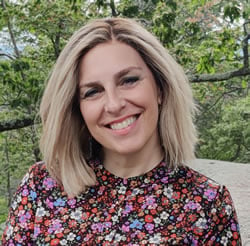Recently, at our Institute of Jewish Studies, I organized a mini-summer series entitled "Tears of Joy, Tears of Sorrow."
Several guest speakers examined joy and sorrow from different vantage points — from a mystical perspective all the way to the psychological aspect. Rabbis dealt with the spiritual aspects of joy and taught the source texts that describe a time of eternal joy. A psychiatrist explained the emotions we experience which plunge us to the depths of the worst feelings of helplessness, and provided practical tools to emerge from "pieces to peace."
And then I had asked a friend of mine to speak from a personal perspective. I titled her lecture, "Does G‑d Care When I'm Sad?"
I wasn't sure how comfortable my friend would be to open up on a personal level. But I figured that the topic was broad enough for her to broach as distantly, or — hopefully — as intimately as she chose. What I was sure was that this friend had experienced her share of sadness and tragedy. I was positive that she had grappled with this very question, many a time.
Though only in her twenties at the time, my friend, Esther, had fought and overcome two bouts of cancer. As if that wasn't enough, she had lost a child in the most trying of circumstances.
Esther had tucked her two-year-old under his covers one night, with a simple case of childhood chicken pox. She awoke the next morning to discover her child dead in his bed. An infection of the blood had fulminated during his sleep, and in the silent black night the child's organs collapsed, one by one.
At what moment her child closed his eyes for the last time, as well as whether he actually called to his parents, is anyone's guess. But the hard fact of reality confronted Esther in the morning, with the cold body of her child lying before her disbelieving eyes.
Our community was in a state of shock with the abrupt snuffing of this young life. But no one could possibly fathom the immense shock and grief felt by this young mother.
Several years had now passed since that tragic night, and Esther had given birth to several more children. But the trauma of such an immense loss is a wound that never heals entirely. While the pain numbs slightly, the empty hole is carried forever.
My friend began her speech by saying, "While I do not know many of you, I do know why Chana has asked me speak tonight."
At the outset Esther asked us, "Please do not mind my tears, since this is the first time that I am publicly speaking about such a personal issue. But when Chana called me, I felt that the time had come to confront the challenge and see if I could share my experience."
She explained briefly the events of her child's passing and continued to refer to it as "that night" because it was, understandably, too difficult to enunciate the words "death of my child."
Esther elaborated on the many steps that she went through in coping with her loss. During the first year, it took all of her energy to merely wake up in the morning and get dressed. She described how she had asked my father, her rabbi, while he visited her during the shivah, to tell her something — anything, any lesson, any words of comfort. He answered wisely, "No, not now. Now is not yet the time."
Esther explained how this validated the need for someone experiencing the loss of a loved one to mourn, to feel the depths of pain, while still blinded by grief, before searching for any understanding.
Esther read us passages from her personal diary. She showed us through her entries, her poetry and her reflections, how she progressed through the various stages of healing. She described her deep closeness to G‑d throughout her struggles. At times she felt full of questions, anger, depression and sadness, but nevertheless, her relationship with G‑d became far more intense than it had ever been.
With tremendous conviction, she elaborated on her newly achieved awareness and sensitivity as G‑d became a real constant in her life.
And then she spoke about her awareness eventually developing and expanding into consideration for others in similar plights. She recalled how her own mother had said to her, "My dear daughter, despite the pain you are feeling, you must realize that you do not have a copyright on pain. Others are also in pain and suffering. Realizing this in no way diminishes your own pain, but rather provides you with the tools for greater sensitivity."
Esther found those tools and that inner strength to address us that evening.
All the lectures in this multi-part summer series were interesting, relevant and informative, but Esther's talk reached a deep place within each of us — precisely because she had spoken straight from her heart, so personally and so honestly.
We grew strong with her courage; we developed newfound faith with her faith; and we cried, silently or openly, along with the tears that streamed down her cheeks.
As I reflected on her talk afterwards, I realized that her presentation was the most powerful answer to the ever-present question that plagues us all — Does G‑d care when I'm sad?
How can a human being find the strength and courage to emerge from such tragic personal suffering and still function? Moreover, what provides her with the fortitude to share her most intimate, personal experiences so that others, too, can learn and grow?
And what pulls people to shed their own indifference and apathy to deeply embrace a stranger's experiences, relive them with her, and become transformed in the process? What opens us up to feeling such enormous sorrow when another human being is sad, and such care for another's pain?
Such depths of empathy, caring and sharing can only be evoked through the power of the G‑dly core and connection within each of us.
As that G‑dly part in each of us surfaced that evening, what was so explicitly revealed — more convincing than any argument could be — was that we care, simply and only, because You, G‑d, care.







Join the Discussion